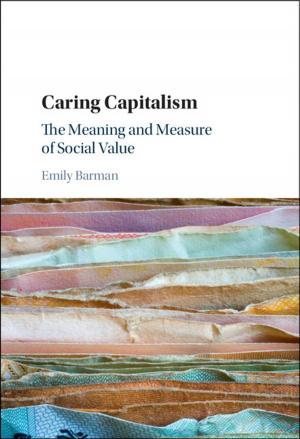The Formation of Papal Authority in Late Antique Italy
Roman Bishops and the Domestic Sphere
Nonfiction, History, Ancient History, Religion & Spirituality| Author: | Kristina Sessa | ISBN: | 9781139179652 |
| Publisher: | Cambridge University Press | Publication: | November 21, 2011 |
| Imprint: | Cambridge University Press | Language: | English |
| Author: | Kristina Sessa |
| ISBN: | 9781139179652 |
| Publisher: | Cambridge University Press |
| Publication: | November 21, 2011 |
| Imprint: | Cambridge University Press |
| Language: | English |
This book is the first cultural history of papal authority in late antiquity. While most traditional histories posit a 'rise of the papacy' and examine popes as politicians, theologians and civic leaders, Kristina Sessa focuses on the late Roman household and its critical role in the development of the Roman church from c.350–600. She argues that Rome's bishops adopted the ancient elite household as a model of good government for leading the church. Central to this phenomenon was the classical and biblical figure of the steward, the householder's appointed agent who oversaw his property and people. As stewards of God, Roman bishops endeavored to exercise moral and material influence within both the pope's own administration and the households of Italy's clergy and lay elites. This original and nuanced study charts their manifold interactions with late Roman households and shows how bishops used domestic knowledge as the basis for establishing their authority as Italy's singular religious leaders.
This book is the first cultural history of papal authority in late antiquity. While most traditional histories posit a 'rise of the papacy' and examine popes as politicians, theologians and civic leaders, Kristina Sessa focuses on the late Roman household and its critical role in the development of the Roman church from c.350–600. She argues that Rome's bishops adopted the ancient elite household as a model of good government for leading the church. Central to this phenomenon was the classical and biblical figure of the steward, the householder's appointed agent who oversaw his property and people. As stewards of God, Roman bishops endeavored to exercise moral and material influence within both the pope's own administration and the households of Italy's clergy and lay elites. This original and nuanced study charts their manifold interactions with late Roman households and shows how bishops used domestic knowledge as the basis for establishing their authority as Italy's singular religious leaders.















